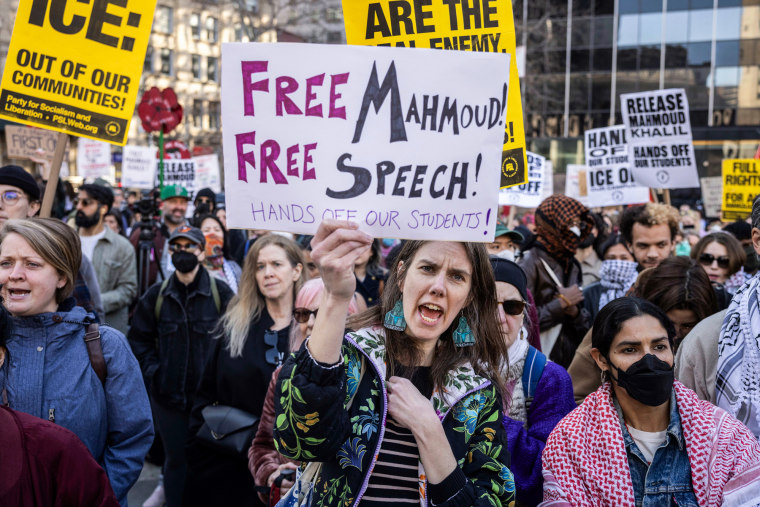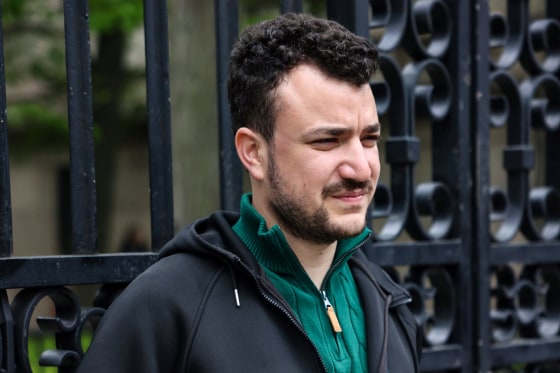Faced with a judge's deadline to provide evidence that Mahmoud Khalil poses a national security threat to the U.S., the Trump administration responded with a brief memo citing the Columbia student protester's beliefs in justifying his deportation.
Khalil, a graduate student who helped lead protests against the war in Gaza last year, was arrested by immigration authorities on March 8. On Tuesday, an immigration judge in Louisiana ordered the federal government to provide evidence by Wednesday justifying its attempt to deport him.
Secretary of State Marco Rubio responded Wednesday evening in a memo obtained by NBC News. In a one-and-a-half-page memo, he cited an obscure provision of the Immigration and Nationality Act of 1952 to justify Khalil’s removal from the U.S.
Rubio said that while Khalil's “past, current or expected beliefs, statements, or associations that are otherwise lawful," the provision allows the secretary of state alone to “personally determine” whether he should remain in the country.
He said that allowing Khalil to stay in the U.S. would create a "hostile environment for Jewish students in the United States.”
“The foreign policy of the United States champions core American interests and American citizens and condoning anti-Semitic conduct and disruptive protests in the United States would severely undermine that significant foreign policy objective,” he wrote.

In response, Khalil's lawyer, Baher Azmy, said that "immigration authorities have finally admitted that they have no case whatsoever against him."
"What this case is really about is whether lawful permanent residents — and other immigrants to this country — can speak out about Israel’s brutal attacks on Gaza and Palestine, or any other important matters of discussion in the national discourse, without fear of deportation for expressing beliefs that the First Amendment completely protects," Azmy said at a virtual news briefing Thursday. "Are U.S. citizens going to be next?”
Assistant Chief Immigration Judge Jamee Comans decided at a hearing on Friday in Louisiana that Khalil can be removed from the United States.
The Louisiana judge affirmed the Trump administration’s controversial argument that Khalil’s beliefs threaten national security and therefore justify his deportation. Khalil's legal team has until April 23 to appeal the ruling.
Marc Van Der Hout, another attorney for Khalil, said at the Thursday briefing that the Rubio memo is the only piece of evidence the government submitted to justify that Khalil’s presence in the U.S. would have “potentially serious adverse foreign policy consequences.”
“The government submitted, as you all have seen now, a two-page document. Two pages, that’s it," Van Der Hout said. "And in that, Secretary of State Rubio says that Mahmoud’s presence here would create adverse foreign policy interests. But what does he talk about? He talks about First Amendment activity in the United States and the effect on people in the United States. His determination, quote, unquote, has absolutely nothing to do with foreign policy.”
In less than five weeks since Khalil's arrest, immigration authorities have arrested dozens of foreign students — many of whom are Muslim — at universities across the country or revoked their visas.
Rubio said last month that the State Department had revoked more than 300 student visas. “We do it every day," he said. "Every time I find one of these lunatics, I take away their visas."
On Wednesday, the Department of Homeland Security announced the creation of a task force to monitor the social media activity of immigrants, including foreign students, for antisemitism. Three sources familiar with the operation told NBC News that the task force will be screening an estimated 1.5 million foreign students studying in the United States for potential grounds to revoke their visas.
The unprecedented actions by the immigration system come amid the federal government's broader crackdown on universities in the name of combatting antisemitism.
In February, the Department of Justice launched a task force to “root out” what it calls “anti-Semitic harassment in schools and on college campuses.”
The administration has also halted hundreds of millions of dollars in federal funding to several universities in recent weeks, including Columbia, Harvard and Princeton, citing dissatisfaction with how they handled last year’s protests against the war in Gaza.


